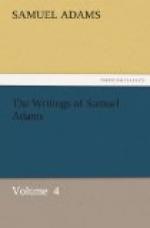Under these impressions, I cannot forbear to mention to you a subject which has lately arrested the public attention and employed the pens of ingenious men of different sentiments concerning it. In discussing a subject so exceedingly momentous as a national Treaty, no personal attachment or prejudice, no private or selfish feelings, no arts of deception should be suffered to intermingle: Truth should be the object, and reason the guide.
By the Constitution of the United States, it is provided, that all Legislative powers therein granted, shall be vested in a Congress, to consist of a Senate and a House of Representatives. These several branches have, and exercise a positive negative upon each other: No Legislative act, therefore, can pass without their joint concurrence. But in another part of the Constitution, under the head of Executive, the President has the power with the advice and consent of the Senate, provided two thirds of the Senate present, concur, to make Treaties; and all Treaties which are made or shall be made under the authority of the United States, shall be among the Supreme Laws of the Land: The Senate therefore partakes with the Executive, so far as to advise and consent; but the most popular branch of Congress has no concern therein. I do earnestly recommend to you to turn your attention to those parts of the Constitution, at least, which relate to the Legislative and Executive powers, and judge for yourself, whether they may not be construed to militate with each other and lead to an absurd conclusion—that there actually exists in the Government of the United States, two distinct and decisive Legislatives.
I am far from being desirous that unnecessary alterations of our Constitution, should be proposed: but it is of great consequence to the liberties of a nation, to review its civil Constitution and compare the practice of its administrators with the essential principles upon which it is founded. We, fellow-citizens, are under the strongest obligations, from the solemnity of our mutual compacts, and even our sacred oaths, with a watchful eye at every point to defend and support our Constitutions; and to strengthen the essential principles upon which they are founded, when it shall be needful, falls in my opinion within those solemn obligations.
I hope, fellow-citizens, that what I am now about to say will not be deemed improper.
I have been accustomed to speak my mind upon matters of great moment to our common country with freedom; and every citizen of the United States has the same right that I have. I may never hereafter have an opportunity of publicly expressing my opinion on the Treaty made with the Court of London: I am therefore constrained with all due respect to our Constituted Authority to declare, that the Treaty appears to me to be pregnant with evil. It controuls some of the powers specially vested in Congress for the security of the people; and I fear that it may restore to Great Britain such an influence over the Government and people of this country as may not be consistent with the general welfare. This subject however it is expected will come before the Congress whose immediate province it is to discuss it, and to determine, so far as it may be in their power, as they shall think, for the safety and welfare of the people.




